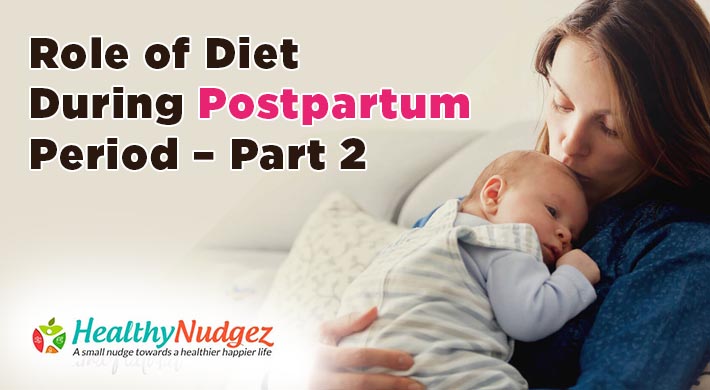Role of Diet During Postpartum Period – Part 2
Postpartum Depression and the Important Nutrients
Common Postpartum Depression Symptoms:
The postpartum symptoms will depend on the type of delivery one had (easy or difficult, vaginal or cesarean) and other individual factors, such as the shape one was in during pregnancy and whether it is the first baby or otherwise.
The most common symptoms that may be experienced by new mom may be:
- Depressed mood or severe mood swings
- Excessive crying
- Difficulty bonding with the baby
- Withdrawn from the family and friends
- Loss of appetite or eating much more than usual
- Inability to sleep (insomnia) or sleeping too much
- Overwhelming fatigue or loss of energy
- Reduced interest and pleasure in activities one used to enjoy
- Intense irritability and anger
- Fear of not being a good mother
- Hopelessness
- Feelings of worthlessness, shame, guilt or inadequacy
- Diminished ability to think clearly, concentrate or make decisions
- Restlessness
- Severe anxiety and panic attacks
- Thoughts of harming oneself or the baby
- Recurrent thoughts of death or suicide
What nutrient deficiencies may contribute to the development of postpartum depression?
The common nutrient deficiencies that have been implicated in depression are:
- Essential fatty acids
- Vitamin D
- B-vitamins (like B6, B9, B12)
- Trace minerals (like zinc, iron, and selenium)
These nutrients frequently become depleted during pregnancy or even before that and may play a role in the development of postpartum depression
Reasons for nutrient-deficiency during postpartum period:
Postpartum women also have increased nutrient demands, especially for healing, recovery, and to support breastfeeding.
- Women enter pregnancy nutrient-deficient due to years of calorie restrictions or a less than optimal diet.
- Increased nutrient demands during pregnancy, childbirth, postpartum healing, and nursing
- Less than required diet at postpartum and
- Use of certain medications
All moms fall into at least one of these categories. Pregnancy, childbirth, postpartum healing, and nursing all have significant nutrient demands. If a woman enters pregnancy nutrient-deficient due to any reason, she may have to pay extra special attention to her diet during/after pregnancy.
Depleting her nutrient reserves throughout pregnancy and failing to recover these reserves postpartum may increase a woman’s risk of depression.

